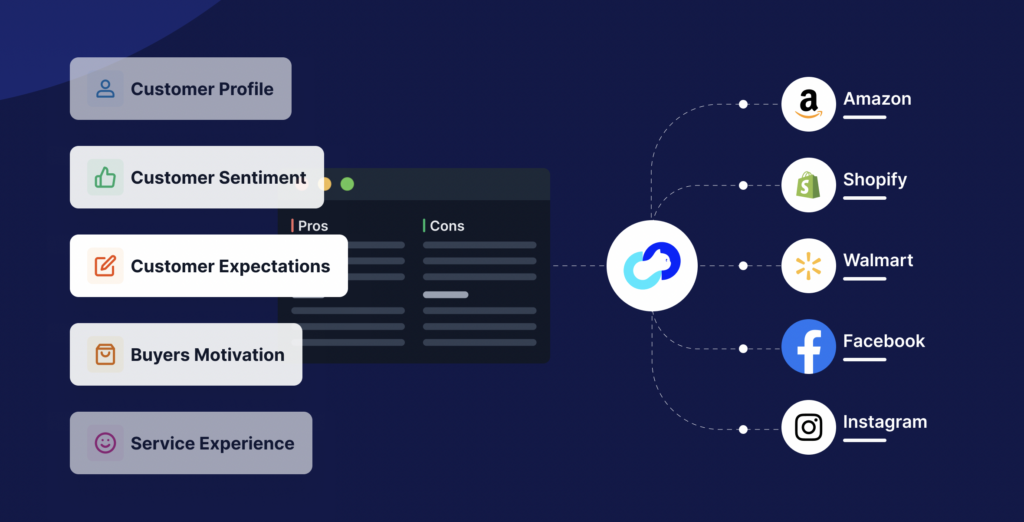
Amazon has made significant changes to its front-end review policy, which now displays the proportion of positive reviews in star ratings. Additionally, Amazon has recently announced the addition of AI-generated review summaries. Compared to previous policy changes, this update is significant, as it emphasizes the authenticity and attributes of products and only displays reviews from verified purchases.
With these new review policy adjustments, Amazon sellers may face a new round of price spirals.
How have Amazon’s review policies changed?
This morning, many Amazon sellers found that the front-end display had changed. Products that previously had tens of thousands of reviews suddenly had their review count hidden and instead displayed the percentage of five-star ratings. On the front-end page, the percentage of five-star ratings for products was displayed as 40%, 63%, 81%, and so on.

This new change has already started to appear on the US and Japan Amazon sites, but not all sellers’ product reviews have been affected, and some sellers have reported that their product front-end pages have not changed. Industry insiders believe that this policy is still in the early testing phase and has not been fully rolled out yet.
Subsequently, some peers reopened their browsers and found that there were differences, and both the rating level and quantity could be seen. There are several different display methods: displaying only one star, 4-star+ review ratio; displaying only one star, review quantity; displaying only one star, 5-star+ review ratio.
This change has sparked a lot of discussion among sellers, with some even calling it a “big earthquake.” It remains to be seen how this change will ultimately be displayed. Based on current feedback, the main impacts are as follows:
- The number of reviews is not as important as before. Hiding the number of reviews weakens the sensory stimulation of thousands or even tens of thousands of reviews on the front-end of older products.
- It benefits new products. Products with a high percentage of five-star ratings should have the ability to compete with older products.
- It is not conducive to product selection. Without being able to see the number of reviews for a product, the reference direction for product selection is lost.
- It exacerbates price competition. Combined with Amazon’s previous changes to the display of sales volume, Amazon may start to focus more on sales volume in the future, exacerbating the price spiral between sellers.
- It requires a focus on product quality. This change will force sellers to improve product quality, giving better products a chance to succeed while low-rated products should be eliminated.
For Amazon sellers, the importance of product reviews is self-evident, and every policy adjustment affects everyone’s sensitive nerves. From Amazon’s first introduction of reviews in 1995 to today, reviews have become an important driving force for consumer purchases, and Amazon has continuously improved and updated its review policies.
Common updates to review features include review titles, photos, and video capabilities. In order to expand the scope and diversity of reviews, Amazon has allowed customers who purchase products to leave quick star ratings without writing a full review since 2019. The importance of review ratings to sellers has become more prominent, and now only the percentage of five-star ratings is displayed on the front-end, which may cater to the fast-paced lifestyle of today’s shoppers and make it easier for buyers to browse.
To make it easier for buyers, Amazon also uses artificial intelligence to summarize review summaries, allowing buyers to make purchasing decisions quickly.
Amazon announced that AI to summarize product reviews.
This week, Amazon announced the launch of a new generative AI tool that summarizes customer reviews of products. The AI tool summarizes the product features and common feedback that customers often mention, and displays them in text form directly next to the product details page, so that users no longer need to sift through hundreds or even thousands of reviews.
Amazon stated that this feature will make it easier for customers to access more reviews. The feature divides product reviews into different attributes such as usability, functionality, and stability, highlighting the common words people use to describe products.

Currently, these AI-generated review summaries can be seen in the Amazon mobile application and have been displayed in multiple categories (but not all categories), including televisions, headphones, tablets, and fitness trackers. It is worth noting that not all products in these categories are applicable, for example, the Galaxy Tab A7 has a review summary, but the newer Galaxy Tab A8 does not.
The new AI-generated customer reviews are the latest innovation in a series of review policies. The following are some of the key changes in this new review policy:
- It seems to mainly display positive reviews.
The new AI-generated reviews display more positive reviews and rarely display negative reviews, or they leave relatively negative content until the end. This may be because Amazon’s search algorithm has elevated the status of high-rated products, making it difficult to find negative product summaries.
- It highlights the key attributes of the product.
In addition to the summary text, Amazon also highlights the product attributes. For example, for the LG 3D Smart TV, the AI-generated review mentions that the product is easy to set up and has excellent streaming speed. Below the text is a list of product attributes, such as “usability” and “stability,” and customers can click on these attributes to get related reviews that mention these keywords.
- It displays authentic product reviews.
Amazon claims that it will use fraud detection tools to regulate AI-generated reviews and will strictly prohibit intentionally misleading customers, providing unfair, untrue, or irrelevant reviews for the product or service. These product summaries only come from verified purchases to reduce fake reviews.
A new round of spiral will start, do small sellers need to lower prices to grab orders?
Like the display of the percentage of five-star ratings, AI-generated review summaries are currently only displayed in some product categories, and many sellers have not yet noticed this adjustment. More than 60% of the sellers surveyed by Yienjun have not yet discovered this change. Both Amazon sellers Grey and Zhou Zhou stated that they have not seen AI-generated review summaries for their products.
Amazon has been testing the use of AI to summarize reviews for some time and officially announced its use this week.
Vaughn Schermerhorn, Director of Community Shopping at Amazon, said, “We have been testing, learning, and fine-tuning AI models, and may expand the review highlights feature to other categories and customers in the coming months, making it easier for customers to submit reviews and add new content types, while using AI to help customers view review highlights.“
As early as June of this year, some overseas observers noticed that Amazon was testing review summaries and posted some examples.
At that time, this new change sparked discussion among sellers. Some sellers believed that Amazon’s adjustment made the number of reviews less important, and the tens of thousands or even hundreds of thousands of reviews for many older products on Amazon may no longer exist in the face of AI.
However, many industry insiders believe that Amazon’s use of artificial intelligence to summarize product reviews means that the number of reviews will still be important in the future. This is because a product that can be summarized by AI requires a large number of reviews to support it. If there are only a few reviews, it cannot fully reflect the comprehensiveness of a product.
Now, considering Amazon’s hiding of the number of reviews on the front end, the number of reviews may not be as important in the future, and sellers will need to focus on sales volume and product quality instead. In the view of Amazon seller “Big Cat,” everyone may have to lower their prices and compete for orders, as a new round of competition is about to begin.
Another feature of Amazon’s AI-generated review summaries is the blocking of non-genuine reviews. Sellers have always believed that Amazon has been cracking down on fake reviews, and this policy adjustment will certainly pay attention to this area. In the future, brushing orders are destined to not last long.
“The new AI-generated review summaries only apply to verified and trustworthy reviews that we have purchased,” said Schermerhorn. He also said that Amazon welcomes real reviews, whether positive or negative, but strictly prohibits false reviews that intentionally mislead consumers by providing unfair, untrue, or irrelevant information.
The ultimate goal of Amazon’s wave of review policy adjustments is to make it easier for customers to browse product reviews and promote more purchases. For sellers, no matter how the review policy changes, they must ultimately focus on their products and adapt to changes.
Are there better methods to help us adapt to Amazon’s rule changes?
There are some ways to obtain Amazon review data and use it to drive business growth. Here are some potentially useful methods:
- Use third-party tools: There are some third-party tools that can help you collect and analyze Amazon review data. These tools can help you understand how customers perceive your products and how your products are performing in the market. Some popular tools include Jungle Scout, Helium 10, and AMZFinder.
- Get data through Amazon API: Amazon provides an API that allows you to access review data. You can use this data to understand how customers perceive your products and improve your products and services based on their feedback.
- Get data through Amazon advertising: If you run ads on Amazon, you can use advertising data to understand how customers perceive your products. You can look at data such as click-through rates, conversion rates, and sales to understand how your ads are influencing customer purchase decisions.
- Get data through Amazon Seller Central: Amazon Seller Central provides some useful data that can help you understand how customers perceive your products. You can look at data such as product ratings, review counts, and response rates to understand how your products are performing in the market.
Regardless of which method you use, you should view customer feedback as an opportunity to improve your products and services. By understanding customer needs and preferences, you can improve your products and services, thereby increasing customer satisfaction and driving business growth.
Shulex VOC — the #1 ChatGPT tool for Amazon
Shulex VOC helps sellers(brands) to identify market opportunities and define winning products by leveraging sentiment analysis & AI/ChatGPT technology.With Shulex VOC, you can quickly obtain a comprehensive analysis of Amazon reviews, compare with competitors, and download data. By analyzing user feedback, you can understand the strengths and weaknesses of your products, consumer preferences, and usage scenarios, which can help you make better product selections, advertising decisions, and drive business growth.

The core functions of Shulex VOC:
- Shulex Market Insight
- Shulex AI Chatbot
- Voice of Customer Analysis
- Best Helium 10 Alternative
- Sentiment Analysis
- Competitive Analysis
- Customer Analytics
- Product Research
- Amazon Review Analysis
With Shulex VOC, you can quickly obtain a comprehensive analysis of Amazon reviews, compare with competitors, and download data. By analyzing user reviews, you can understand the strengths and weaknesses of your products, consumer preferences, and usage scenarios, which can help you make better product selections, advertising decisions, and drive business growth.
